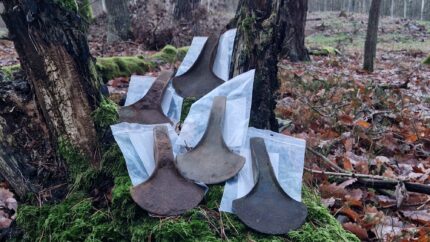 A hoard of five Bronze Age axe heads in excellent condition have been found in the Starogard Forest District in Kociewie, Poland. Preliminary estimates date them to about 3,500 years ago. While individual finds of these types of axes have been found in Poland before, the last one was discovered 20 years ago in the Lublin area the this is the first time a hoard of five has ever been discovered.
A hoard of five Bronze Age axe heads in excellent condition have been found in the Starogard Forest District in Kociewie, Poland. Preliminary estimates date them to about 3,500 years ago. While individual finds of these types of axes have been found in Poland before, the last one was discovered 20 years ago in the Lublin area the this is the first time a hoard of five has ever been discovered.
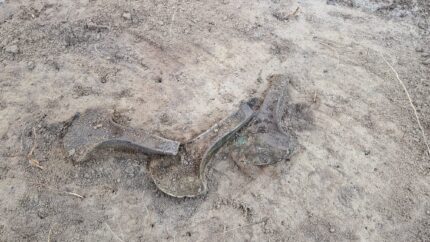 The axes were first discovered by metal detectorist Denis Konkol who was searching the area with the explicit permission of the Provincial Office for the Protection of Monuments. As soon as he spotted the axes, he secured the area and alerted authorities. And the conservator of monuments from Gdańsk then excavated the site.
The axes were first discovered by metal detectorist Denis Konkol who was searching the area with the explicit permission of the Provincial Office for the Protection of Monuments. As soon as he spotted the axes, he secured the area and alerted authorities. And the conservator of monuments from Gdańsk then excavated the site.
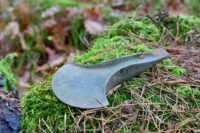
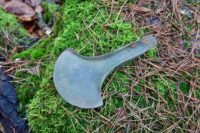 The five axe heads were less than a foot underground, buried beneath a layer of turf and humus. Their large size, slender necks leading to broad, semi-circular blades classify them as Tautušiai type axes (after the village in Lithuania where they were first discovered), which dates them to between 1700 and 1300 B.C. The type is quite rare as they do not originate in the area and the axes show little evidence of wear and tear. Archaeologists believe they may have been deposited as offerings or been hastily concealed by a trader.
The five axe heads were less than a foot underground, buried beneath a layer of turf and humus. Their large size, slender necks leading to broad, semi-circular blades classify them as Tautušiai type axes (after the village in Lithuania where they were first discovered), which dates them to between 1700 and 1300 B.C. The type is quite rare as they do not originate in the area and the axes show little evidence of wear and tear. Archaeologists believe they may have been deposited as offerings or been hastily concealed by a trader.
Traditionally, Bronze Age deposits in the region yielded predominantly bracelets or breastplates, making the discovery of these axe heads a distinctive archaeological marvel, according to [Igor Strzok, the Pomeranian Provincial Conservator of Monuments].
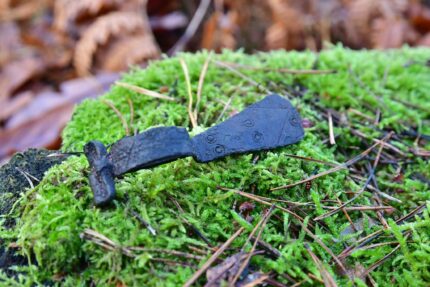 The practice in the case of these types of discoveries is to widen the excavation to a radius of up to a few hundred feet beyond the find site. This time the team did not find any more Bronze Age artifacts, but they did discover a fibula (a brooch used to fasten garments) that dates to around 2,000 years ago.
The practice in the case of these types of discoveries is to widen the excavation to a radius of up to a few hundred feet beyond the find site. This time the team did not find any more Bronze Age artifacts, but they did discover a fibula (a brooch used to fasten garments) that dates to around 2,000 years ago.
The axes and fibula have been transferred to the Archaeological Museum in Gdańsk for further study and conservation.